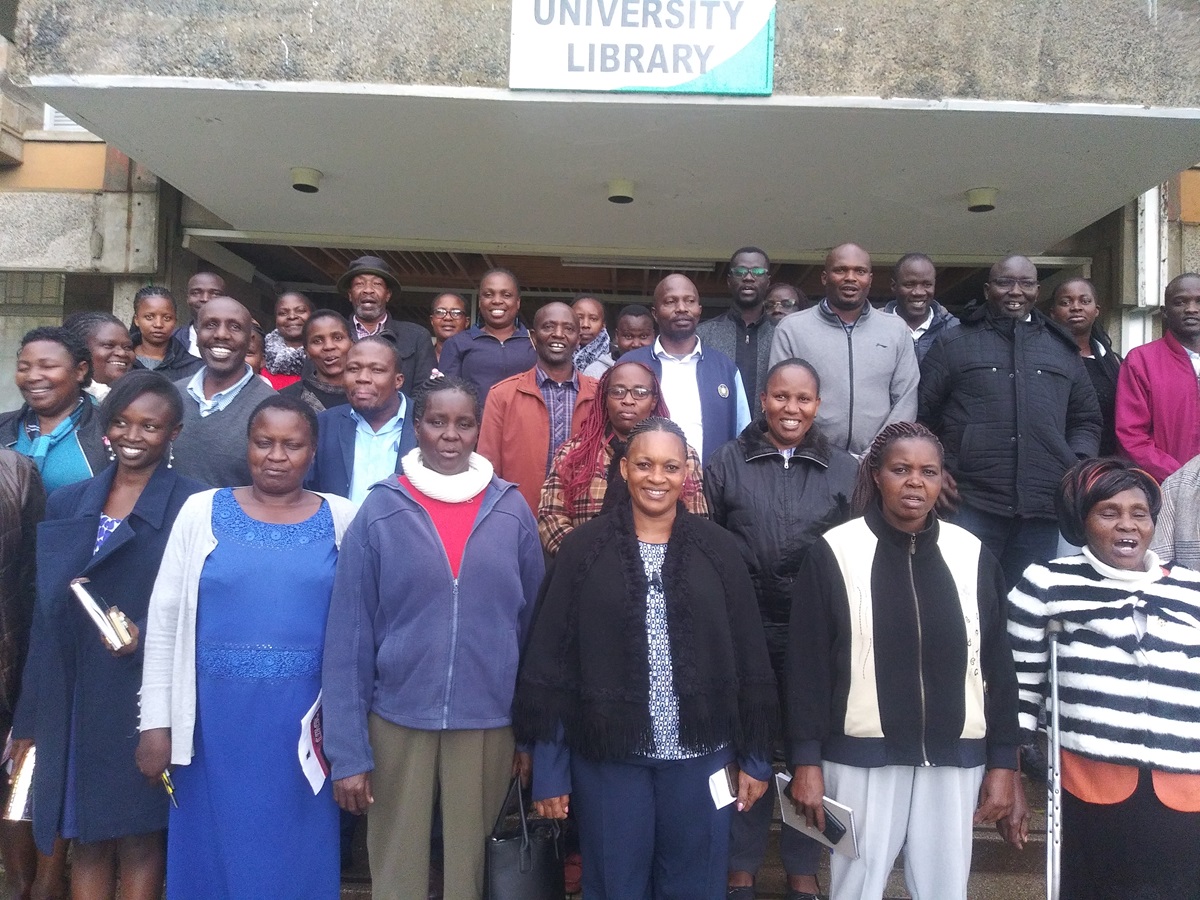-

BY ERIC SINDABI
The University Library Advisory Committee, led by the chairperson Professor Benard Aduda,Deputy Vice-Chancellor Academic, Research and Extension visited the Library Department on 13th February, 2024 to familiarise with the Library services and facilities.
-

In a gesture of good will for the dissemination of Knowledge, Egerton University Library Department through the office of the Vice-Chancellor has donated 686 volumes of books to the Nakuru County Assembly to enrich its special library collection.
The donation process commenced in October, 2023 after a formal request by the Clerk of the County Assembly Ms Jane Waweru who had noted in the request letter that the County Assembly Library was soliciting for book donations to meet the growing needs of its readers.
-

The University Library Community Outreach team pitched tent at Lions Children’s Home on March 22, 2024 in an event dedicated at fostering a reading culture among young children. The request for the pivotal library activity was initiated by the University Librarian Mrs.Janegrace Kinyanjui in an official communication to the Children’s Home Administration.
-

On February 12, 2024 fifty University Library members of staff gathered at the Library’s Resource Centre for a pivotal meeting that was chaired by the University Librarian Mrs.Janegrace Kinyanjui.
-

During the University Library Department’s 16th Annual General Meeting held on September 30, 2024, members of staff were sensitised on the department's revised Citizen Service Delivery Charter. This exercise was a key agenda item, aimed at familiarising staff with the revised charter and emphasising its importance following a successful revision.
The need to revise the department’s Citizen Service Delivery Charter was commissioned by University Librarian Mrs.Janegrace Kinyanjui during the department’s 15th Annual General Meeting on February 9, 2024. The revision was coordinated by the office of the Assistant Librarian in charge of Library Technical Services. The exercise,according to the University Librarian was deemed significant due to the tremendous changes and developments in the University Library's services over the past decade.
The revised University Library Citizen Service Delivery Charter includes updates in key areas of library service development, such as the acquisition and dissemination of electronic reading and research materials, the digitisation of research outputs from academic departments, the survey and appraisal of university records, access to university archival records, and the procedures for scanning, printing, and reprographic services.
The theme of the University Library Citizen Service Delivery Charter is: “Expediting Access to Information for Learning, Research, and Other Academic Activities by Constantly Updating Resources, Improving Personal Skills in Library and Information Services, and Participating in National, Regional, and International Information Networks.”
Citizen Service Delivery Charters are published agreements between the public and respective organisations that outline expectations and standards for service and product delivery. These charters were inspired and popularised by ISO 9001, a global body promoting Quality Management Systems. Key components of a Citizen Service Delivery Charter include detailed descriptions of services, requirements for service delivery, specifications of any fees associated with the service, and the time frame for delivery.
-

BY ANDREW NJUGUNA & ERIC SINDABI
The James Foster Collection, located at the JD Rockefeller Library within Egerton University, is a significant archive representing 170 years of Kenya's cultural heritage. This collection comprises 3,000 books that delve into the geographical, historical, and socio-economic aspects of Kenya’s past. Originating from Foster’s private library, it serves as a valuable resource for understanding the rich legacy of knowledge and cultural representation that has developed over centuries, akin to the ancient libraries of Greece, Rome, Middle - East and African archives.
James Foster, born on August 22, 1929, in York, England, had an illustrious educational background, having attended notable institutions like Knox Grammar School and Marlborough College. His professional journey began in the British Army Academy and included roles in the Kenya Police Service and various senior positions in private companies such as East African Power and Lighting Company. Beyond his professional commitments, Foster was deeply involved in community service through organisations like the St. John Ambulance Brigade.

Readers are mesmarised by some of the 3000 volumes of James Foster Kenya's heritage themed book collection during a recent University Cultural Week event./Eric Sindabi.
Foster's true legacy, however, lies in his dedication to preserving Kenya’s heritage. By donating his extensive library to Egerton University, he aimed to support the institution’s mission of knowledge generation and preservation. This collection enhances the university's role in facilitating education and research across various disciplines, including history, geography, sociology, ecotourism, economics, and political science. Analysts note that the collection provides crucial access to rare historical volumes, addressing gaps in previous studies and positioning Egerton University as a center of academic excellence.
Initially hesitant to part with his collection, Foster was encouraged by former Chancellor Professor Shem Wandiga and a team of academic staff drawn from the Faculty of Arts and Social Sciences led by Professor Emilia Ilieva. Through numerous discussions and visits to the university, the celebrated collector was reassured that his collection would be safeguarded and utilised effectively. Ultimately, Foster formally donated his library in a vibrant ceremony on February 2, 2016, having chosen Egerton University over interest from other institutions like the University of Nairobi and Kenyatta University.
In addition to the James Foster Collection, Egerton University Library houses several other notable private collections including; the Professor Henry Olela Collection, the Dr. Taaitta Toweett Collection, and the Daisaku Ikeda Collection all based at the Faculty of Arts and Social Sciences Library. Together, these collections reinforce the university’s commitment to academic excellence and cultural preservation for future generations.
.......................................................................................The writers are members of the University Library Marketing Committee........................................................................
-

BY ERIC SINDABI
The University Library department held a training session on January 17, 2025, to introduce staff and students to the e.Library USA, an online resource initiative facilitated by the United States of America Embassy in Kenya. The event, which combined both in-person and virtual participation, targeted undergraduate and postgraduate students as well as library staff, with a total of sixty participants in attendance.
The American Spaces programme, a U.S. foreign policy initiative aims at promoting education and recreation through a range of free online resources and services to enhance academic and personal development. Participants were guided on how to register and access a wide array of materials, including academic resources such as journal articles, theses, e-books, media materials like U.S.-based magazines, newspapers, and films, as well as other informational content.
Beyond providing digital learning tools, the American Spaces programme offers additional services that extend its educational and cultural scope. These include information and guidance on studying in the United States, cultural and historical insights about the U.S., and opportunities for exchange programmes. The initiative also supports civic education on democracy, skills-building workshops, alumni engagement, and fellowship opportunities in the U.S.
“This training is part of the library’s commitment to equipping students and staff with the tools they need to access and utilize global knowledge,” said Mr.Rotich during the session.
Mr. Asutsa expressed enthusiasm of the programme’s potential of empowerment and benefits especially its focus on free access to quality resources and educational opportunities stressing that the programme aims to bridge the gap between local academic needs and global knowledge systems. Mr.Kazungu on the other hand, noted that the collaboration between the U.S. Embassy and the Kenya National Library Services underscores the value of fostering international partnerships to enhance education and cultural ideals in Kenya.
-

This data-driven approach is expected to enhance service delivery by ensuring that resources align with the ever changing demands of students, academic staff, as well as library staff and management”
In a bid to modernise Library management and improve service delivery, the University Library recently rolled out a comprehensive training programme on the new Koha Library System. The training, which took place from June 17th to June 19th, 2025, targeted all Library staff to familiarise them with the new open-source platform. The move aims to replace the AMLIB system that had served the University Library operations for several years.
The training programme was organised and facilitated by the Library ICT Committee, which is headed by Mr. Kenneth Rotich. Mr.Rotich, together with a team of other librarians, led the sessions and provided practical demonstrations of the new Koha system’s functionalities.
“The Koha system is a robust, open-source platform that offers a high degree of customization. It is designed to accommodate a variety of library needs, from resource management to client services, and it will enable the Library to provide a more responsive and efficient library experience,” explained Mr.Rotich.
The training covered several modules of the Koha system, each addressing key areas of library operations. Staff were introduced to the system’s administrative functions, including the configuration and management of user access and system settings. Additionally, the course provided an in-depth training on cataloguing and classification of reading materials, an essential aspect of managing the library’s extensive collection of books, journals, and digital resources.
Participants also explored the Online Public Access Catalogue (OPAC), a crucial feature of Koha that enables users to easily search and access both physical and digital library resources. “This feature allows library clients to identify and retrieve information materials remotely, making it an essential tool in enhancing user convenience,” noted Mr. Andrew Njuguna a systems librarian and the In-charge Faculty of Law Library.
Other key features of the Koha system covered in the training included acquisition and management of information resources, the handling of serials (e.g., journals and periodicals), and the preparation and management of client data. The system’s integrated approach to resource management is expected to improve the library’s ability to handle large volumes of data while ensuring accuracy and efficiency.
The Koha platform allows for improved tracking of library usage patterns, helping staff gain a better understanding of users’ needs and preferences. “This data-driven approach is expected to enhance service delivery by ensuring that resources align with the ever changing demands of students, academic staff, as well as library staff and management,’’ said Mr. Steve Okech,one of the trainers.
In her closing remarks after the fruitful training, the University Librarian Mrs Janegrace Kinyanjui acknowledged that while the transition to a new system comes with challenges, the long-term benefits outweigh the initial learning curve. She encouraged the library staff to be proactive in mastering the system while highlighting the importance of ongoing training and knowledge sharing.
“The Division of Digital Library Services will continue to support the staff as they transition to the new system. Regular follow-up training sessions and troubleshooting support will be available to ensure a smooth implementation of Koha across the University’s library network,” She said.
Koha is among the world's most widely used open-source Integrated Library Systems (ILS). It dates back to 1999 in New Zealand where it was developed by a library based consortium called the Horowhenua Library Trust. The library was in need of a system to manage its resources and embarked on a journey to build its own software, which would eventually become Koha. The web based library system provides affordable, customizable, and scalable solutions for libraries, particularly in the context of rising costs of acquiring and maintaining information systems.
Koha is sustained by the Koha Community, a worldwide group of library professionals, systems developers, and organizations. As an online software, the system fosters interactivity among users, enabling continued adjustments to meet the evolving needs of libraries. The name Koha is derived from an aboriginal New Zealand language and means to gift or give back to the community.















